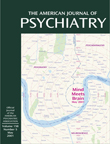Adderall for Obsessive-Compulsive Disorder
To the Editor: Obsessive-compulsive disorder (OCD) is a common psychiatric problem. Although major advances in diagnosis and treatment have been realized in the last 20 years, current psychiatric interventions have limited efficacy and usually leave residual symptoms (1). As there is a need to find more effective treatments, we report on a surprising finding with a treatment-resistant patient that may highlight one future direction for research.
Mr. A was a 55-year-old man who had experienced OCD symptoms since childhood. At age 3 he had to reenter rooms until they “felt right.” He also described the symptoms of Tourette’s syndrome, such as rubbing his face with both hands, coughing, and adding words to the ends of sentences. In childhood he had numerous streptococcal infections and chorea-like movements. There was a significant family history of rheumatic fever and possible Sydenham’s chorea. His mother, two of his three children, and several maternal aunts all had OCD. Mr. A underwent medication trials with selective serotonin reuptake inhibitors, all at high doses, and was given behavior therapy—all to no avail.
When he came in for treatment, he exhibited continuous OCD symptoms, including touching, retracing his path, repeating words, counting, and putting things in order. He scored 39 on the Yale-Brown Obsessive Compulsive Scale. Mr. A was eligible to undergo anterior capsulotomy at our clinic, but he opted for an experimental protocol with deep-brain stimulation of the anterior internal capsule. Another center in Europe had reported initial success using this same approach (2). However, Mr. A’s condition did not improve, so the implants were removed.
Six months later, after experiencing no clinical change, Mr. A reported a dramatic improvement while taking Adderall, a combination of dextroamphetamine and amphetamine, which had originally been prescribed for his son’s attention deficit hyperactivity disorder. Mr. A would not allow his son to take the medication until he had experienced its side effects firsthand. During his trial of the drug, Mr. A noted that he could easily put obsessional thoughts out of his mind, and his rituals decreased. His Yale-Brown Obsessive Compulsive Scale score dropped to 12. Mr. A described the onset of improvement within 30 minutes of taking only 5 mg of the drug, but the benefit began to wear off after 3 hours. His dose was currently 10 mg t.i.d. It is of interest that the use of Adderall did not worsen his tics.
There have been other reports of the use of stimulants to treat OCD, including a small double-blind study of dextroamphetamine versus methylphenidate versus placebo that found a superior improvement with medications from the dextroamphetamine group (3). There is clearly a need for further controlled studies in this area.
1. Eisen JL, Goodman WK, Keller MB, Warshaw MG, DeMarco LM, Luce DD, Rasmussen SA: Patterns of remission and relapse in obsessive-compulsive disorder: a 2-year prospective study. J Clin Psychiatry 1999; 60:346–351Crossref, Medline, Google Scholar
2. Nuttin B, Cosyns P, Demeulemeester H, Gybels J, Meyerson B: Electrical stimulation in anterior limbs of internal capsules in patients with obsessive-compulsive disorder (letter). Lancet 1999; 354:1526Crossref, Medline, Google Scholar
3. Joffe RT, Swinson RP, Levitt AJ: Acute psychostimulant challenge in primary obsessive-compulsive disorder. J Clin Psychopharmacol 1991; 11:237–241Crossref, Medline, Google Scholar



